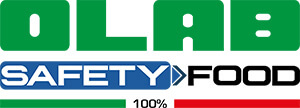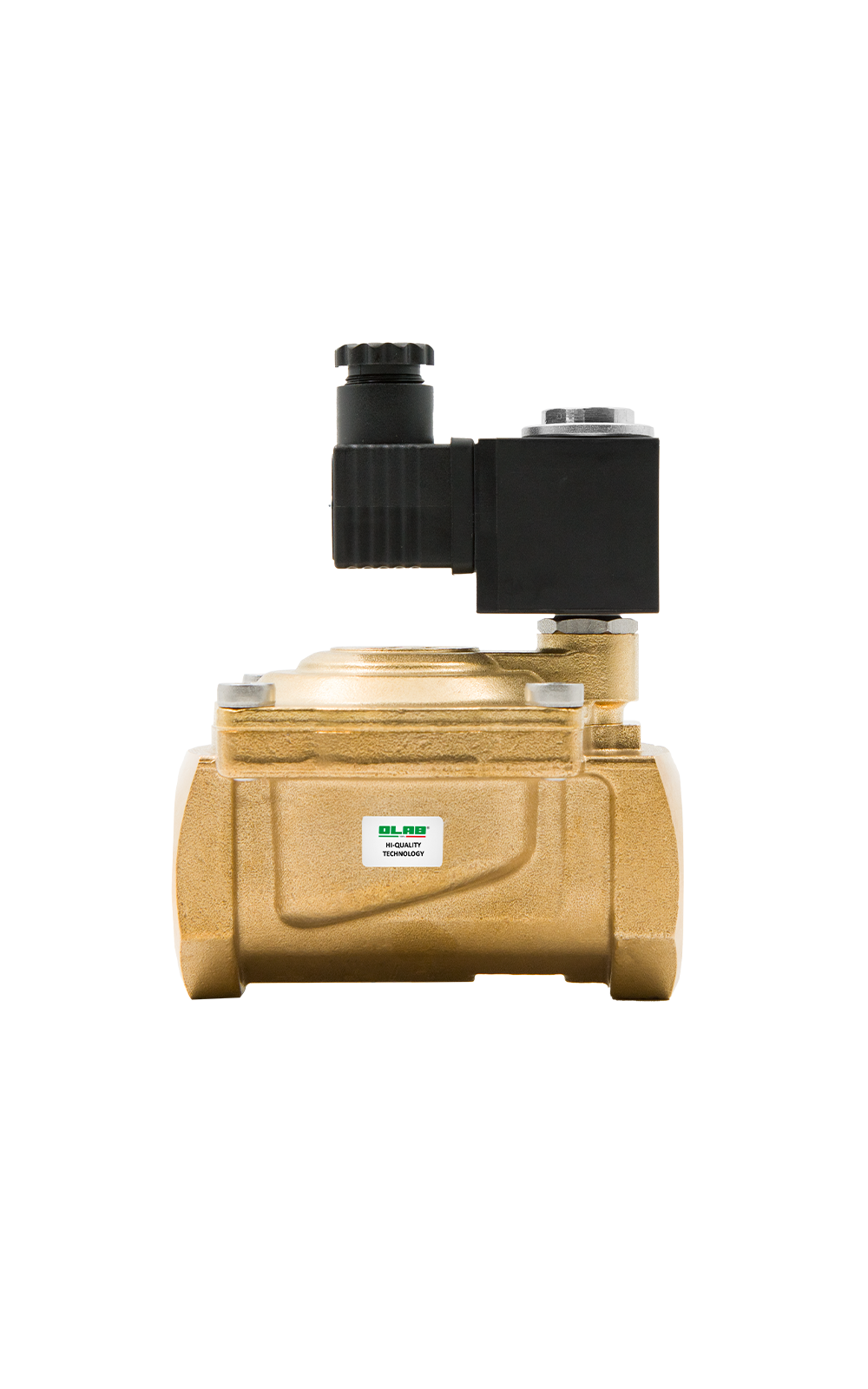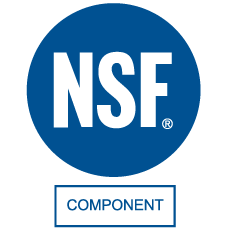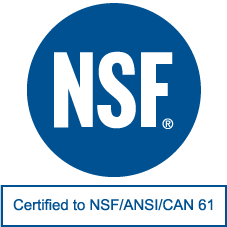







Ways: 2/2
Notes:
The Series
18001L is a 2/2-way normally closed solenoid valve with indirect acting
system, specifically designed for use with potable water and fluids
intended for human consumption, in full compliance with the most stringent
international food-grade standards. Manufactured with certified
materials and featuring a CW510L-OT57 lead-free brass body, the
valve is suitable for food contact and certified NSF COMPONENT
and NSF/ANSI/CAN 61.
The availability of EPDM, RBX or NBR sealing elements,
combined with a proven internal architecture, makes this valve ideal for drinking
water treatment and distribution systems, both in civil and industrial
applications. The AISI 304 stainless steel sleeve with laser-welded fixed
core ensures durability and long-term sealing performance, even under
pressure and thermal cycling.
The valve is actuated by a 30 mm coil (8000BH), built
in class H insulation (180°C / 356°F), designed to ensure thermal
resistance and operational stability in systems exposed to continuous-duty
conditions. The indirect acting design allows the valve to handle high
flow rates and significant pressure differentials, even with large
orifice diameters, while maintaining a responsive and reliable operation.
Thanks to its pilot-operated system, the Series
18001L performs efficiently under high-pressure conditions with reduced
power consumption, contributing to the overall energy efficiency of the
system.
Operating temperature range varies depending on the
sealing material: NBR from –20°C to +90°C (–4°F ÷ +194°F), RBX from
–15°C to +150°C (+5°F ÷ +302°F), EPDM from –30°C to +145°C (–22°F ÷
+293°F). The maximum operating pressure (PS) is 20 bar (290 psi).
The valve is available with female threaded connections 3/8",
1/2", 3/4", and 1", and comes with IP65 protection rating
and certifications: CE, VDE, UL, NSF COMPONENT, NSF/ANSI/CAN 61.
Technical features:
CERTIFIED NSF COMPONENT AND NSF/ANSI/CAN 61
Manufactured with certified materials in compliance with international regulations for food-grade applications, this valve is suitable for systems where direct contact with fluids intended for human consumption is required.
DESIGNED FOR POTABLE WATER APPLICATIONS
The CW510L-OT57 lead-free brass body, compliant with NSF USA standards, and the availability of EPDM or RBX seals make this valve ideal for drinking water treatment and distribution systems.
ENGINEERED FOR HEAVY-DUTY OPERATION WHERE THE COIL IS HIGHLY STRESSED
The 30 mm coil, built with class H insulation (180°C / 356°F), ensures thermal resistance and operational stability, even in continuous or intensive duty cycles.
HIGH OPENING DIFFERENTIALS WITH LARGE ORIFICE DIAMETERS
The indirect acting design enables the valve to handle high flow rates and significant pressure differentials, while maintaining reliability and responsiveness, even with large internal passages.
LOW SOLENOID POWER REQUIREMENT UNDER HIGH PRESSURE CONDITIONS
Thanks to the pilot-operated principle, the valve performs efficiently under high-pressure conditions, requiring minimal power input for actuation, thus enhancing the overall energy efficiency of the system.
The Series
18001L is a 2/2-way normally closed solenoid valve with indirect acting
system, specifically designed for use with potable water and fluids
intended for human consumption, in full compliance with the most stringent
international food-grade standards. Manufactured with certified
materials and featuring a CW510L-OT57 lead-free brass body, the
valve is suitable for food contact and certified NSF COMPONENT
and NSF/ANSI/CAN 61.
The availability of EPDM, RBX or NBR sealing elements,
combined with a proven internal architecture, makes this valve ideal for drinking
water treatment and distribution systems, both in civil and industrial
applications. The AISI 304 stainless steel sleeve with laser-welded fixed
core ensures durability and long-term sealing performance, even under
pressure and thermal cycling.
The valve is actuated by a 30 mm coil (8000BH), built
in class H insulation (180°C / 356°F), designed to ensure thermal
resistance and operational stability in systems exposed to continuous-duty
conditions. The indirect acting design allows the valve to handle high
flow rates and significant pressure differentials, even with large
orifice diameters, while maintaining a responsive and reliable operation.
Thanks to its pilot-operated system, the Series
18001L performs efficiently under high-pressure conditions with reduced
power consumption, contributing to the overall energy efficiency of the
system.
Operating temperature range varies depending on the
sealing material: NBR from –20°C to +90°C (–4°F ÷ +194°F), RBX from
–15°C to +150°C (+5°F ÷ +302°F), EPDM from –30°C to +145°C (–22°F ÷
+293°F). The maximum operating pressure (PS) is 20 bar (290 psi).
The valve is available with female threaded connections 3/8",
1/2", 3/4", and 1", and comes with IP65 protection rating
and certifications: CE, VDE, UL, NSF COMPONENT, NSF/ANSI/CAN 61.
Technical features:
CERTIFIED NSF COMPONENT AND NSF/ANSI/CAN 61
Manufactured with certified materials in compliance with international regulations for food-grade applications, this valve is suitable for systems where direct contact with fluids intended for human consumption is required.
DESIGNED FOR POTABLE WATER APPLICATIONS
The CW510L-OT57 lead-free brass body, compliant with NSF USA standards, and the availability of EPDM or RBX seals make this valve ideal for drinking water treatment and distribution systems.
ENGINEERED FOR HEAVY-DUTY OPERATION WHERE THE COIL IS HIGHLY STRESSED
The 30 mm coil, built with class H insulation (180°C / 356°F), ensures thermal resistance and operational stability, even in continuous or intensive duty cycles.
HIGH OPENING DIFFERENTIALS WITH LARGE ORIFICE DIAMETERS
The indirect acting design enables the valve to handle high flow rates and significant pressure differentials, while maintaining reliability and responsiveness, even with large internal passages.
LOW SOLENOID POWER REQUIREMENT UNDER HIGH PRESSURE CONDITIONS
Thanks to the pilot-operated principle, the valve performs efficiently under high-pressure conditions, requiring minimal power input for actuation, thus enhancing the overall energy efficiency of the system.